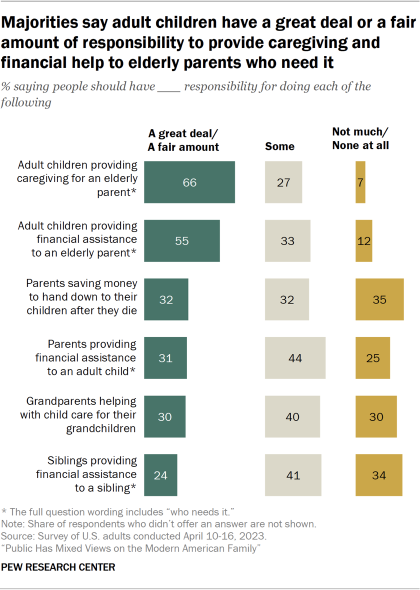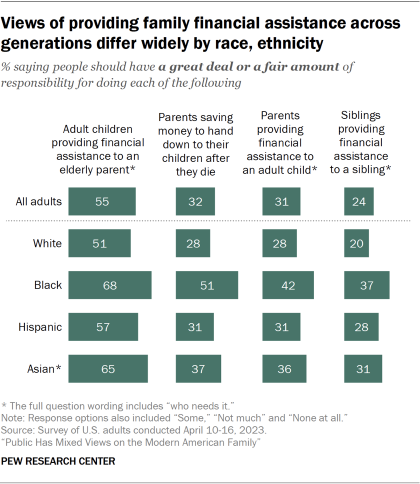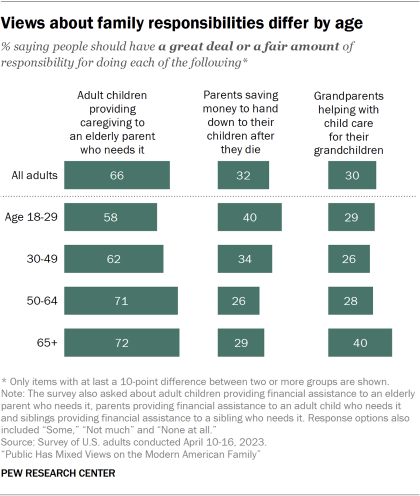Family members help each other in a variety of ways, and oftentimes that assistance cuts across generations. The public makes clear distinctions between the types of things family members should be expected to do for their loved ones and the things that are less essential.

Roughly two-thirds of adults (66%) say grown children should have a great deal or a fair amount of responsibility to provide caregiving for an elderly parent who needs it. This includes 32% who say they have a great deal of responsibility.
A majority (55%) say adult children have a great deal or a fair amount of responsibility to provide financial assistance to an elderly parent in need, with 24% saying they have a great deal of responsibility.
When it comes to parents providing financial assistance for an adult child who needs it, far fewer Americans say parents have a great deal or a fair amount of responsibility: Only 31% say this.
A similar share (32%) say parents have at least a fair amount of responsibility to save money to hand down to their children after they die. About a third (35%) say parents have little or no responsibility to do this.
Three-in-ten adults say grandparents have a great deal or a fair amount of responsibility to help with child care for their grandchildren.
And a smaller share (24%) say siblings have at least a fair amount of responsibility to provide financial assistance to another sibling who needs it.
Race and ethnicity

Views of these responsibilities differ widely by race and ethnicity. On each item, Black adults are more likely than White and Hispanic adults to view family members as responsible. In some cases, these gaps are quite large.
For example, 51% of Black adults say parents should have a great deal or a fair amount of responsibility to save money to hand down to their children after they die. Roughly three-in-ten White (28%) and Hispanic adults (31%) say the same as do 37% of Asian adults.
Similarly, when it comes to siblings providing financial assistance to another sibling who needs it, 37% of Black adults say people have at least a fair amount of responsibility to do this, compared with 20% of White adults and 28% of Hispanic adults. (The share is 31% for Asian adults, which is not statistically different from Black adults.)
Majorities across racial and ethnic groups say adult children have a great deal or a fair amount of responsibility to provide caregiving for an elderly parent who needs it. But even in this case, Black adults (71%) are more likely than White (65%) and Hispanic adults (64%) to hold this view.
Age

Views also differ by age. Adults ages 50 and older are more likely than those younger than 50 to say adult children should have a great deal or a fair amount of responsibility to provide caregiving to an elderly parent who needs it (71% vs. 60%).
For their part, younger adults see greater responsibility for parents to save money to hand down to their children when they die. Among those ages 18 to 29, 40% say parents have a great deal or a fair amount of responsibility to do this. The share is smaller among those ages 30 to 49 (34%), and smaller still among those 50 to 64 (26%) and 65 and older (29%).
The oldest age group stands out as the most likely to say grandparents have at least a fair amount of responsibility to help with child care for their grandchildren. Some 40% of adults ages 65 and older say this, compared with about three-in-ten or less among younger age groups.




